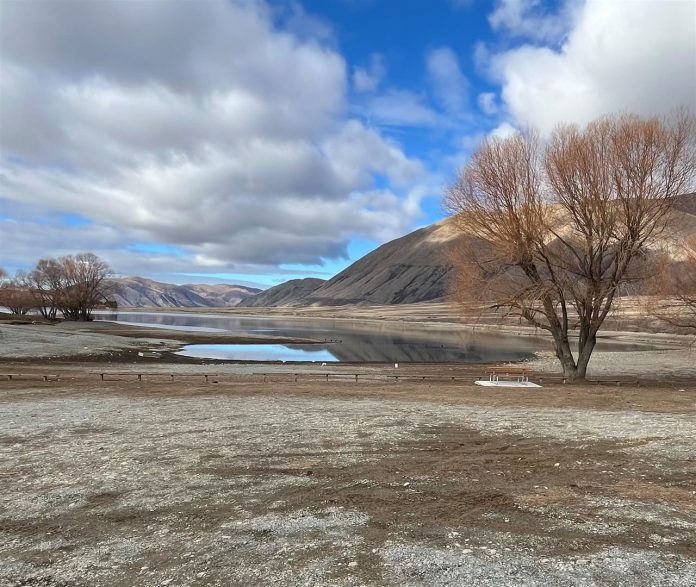
A summer recreational mecca for over half a century, Lake Camp will be too dry to use this summer, families fear.
The Mid Canterbury lake’s level has dropped considerably, sparking a community campaign to restore its historic water source to avoid it becoming a “manky puddle”.
Rangitata MP James Meager has slammed regional council inaction, saying the situation feels like the Greenstreet Creek all over again, “where in a month’s time someone will be apologising for their inaction”.
Native fish died when Greenstreet Creek in Canterbury dried up, despite farmers raising the alarm with the regional council.
“Letting Lake Camp dry up and turn into a muddy puddle is totally unacceptable,” Meager said.
“I’ll be writing to agencies telling them they need to sort this out, before locals take matters into their own hands. And if they did, I wouldn’t blame them.”
But Environment Canterbury says low water levels aren’t having environmental impacts at Lake Camp, and at this stage, there is no need for action.
The Sim family from Methven have waterskied at Lake Camp since the early 1990s, but may not get the chance this summer.
Steph and Mitch Sim’s children are third-generation recreational users of the lake, and they would like to keep the tradition alive.
“It’s a pretty amazing spot up there and the reason we go … is for the lake,” Steph said.
But the state of Lake Camp was “pretty dire” when the family were there in March.
“It’s the lowest I’ve seen it and Mitch has never seen it that low before and he’s been going since he was a kid.”
Low rainfall in the high country and the lack of flow from the Balmacaan Stream has caused the lake to drain away.
It’s frustrating when there is a logical solution that has worked for half a century, she said.
The solution she refers to is a request from the Lake Clearwater Hutholders Association to restore the Balmacaan Stream diversion, which would fill the lake back up.
A diversion from the Balmacaan Stream had previously fed into Lake Camp, helping maintain its levels for over 50 years.
The resource consent for the stream diversion ended in 2020 and the diversion itself was scoured out by flowing in 2021.
ECan and the Department of Conservation have indicated the receding lake level hasn’t impacted the water quality and restoring the diversion would require a resource consent.
Clearwater Aquatic Club president Tony Moore said he is irritated by that stance.
“ECan mechanically opens Lake Ellesmere every year to manage the lake levels, and they are only doing that for the lake’s benefit.
“They are assisting nature elsewhere so what’s the difference at Lake Camp?”
ECan has been accused of just letting nature take its course.
However, surface water science manager Elaine Moriarty said that’s not the regional council’s position.
“We are not currently seeing evidence of environmental harm due to low water levels in this particular lake and that this type of intervention would require a resource consent.”
ECan will intervene where there’s risk to the safety of communities, from flooding for example, or if there is immediate environmental harm.
“Lake Camp’s water levels, although low around the shore, are not impacting the lake’s water quality.
“It has a deep middle section (18m deep) which helps support aquatic life during dry times.
“We do recognise that there may be recreational impacts for people using the lake for water skiing and boating this summer, if lake levels remain low, and that this is disappointing for the community.”
The aquatic club, with a membership of about 60, cancelled annual water ski championships last summer because of the water depth, and it looked unlikely they would hold it this summer, Moore said.
“There is nothing stopping anyone going out there, but [with lower water levels], when you get a few boats and jet skis on there it becomes a real water safety issue.”
The district council has invested in facilities at the Ashburton Lakes and is actively promoting it as a tourism destination, Moore said.
“When people drive in to see Lake Camp it’s the ugly duckling in the middle, the puddle that’s got no water in it.”
The diversion must be restored to allow the lake to fulfil its recreation reserve status, Moore said.
Acting district council chief executive Jane Donaldson said they aware of the situation but the district council “has not been formally approached yet”.
LDR is local body journalism co-funded by RNZ and NZ On Air.



